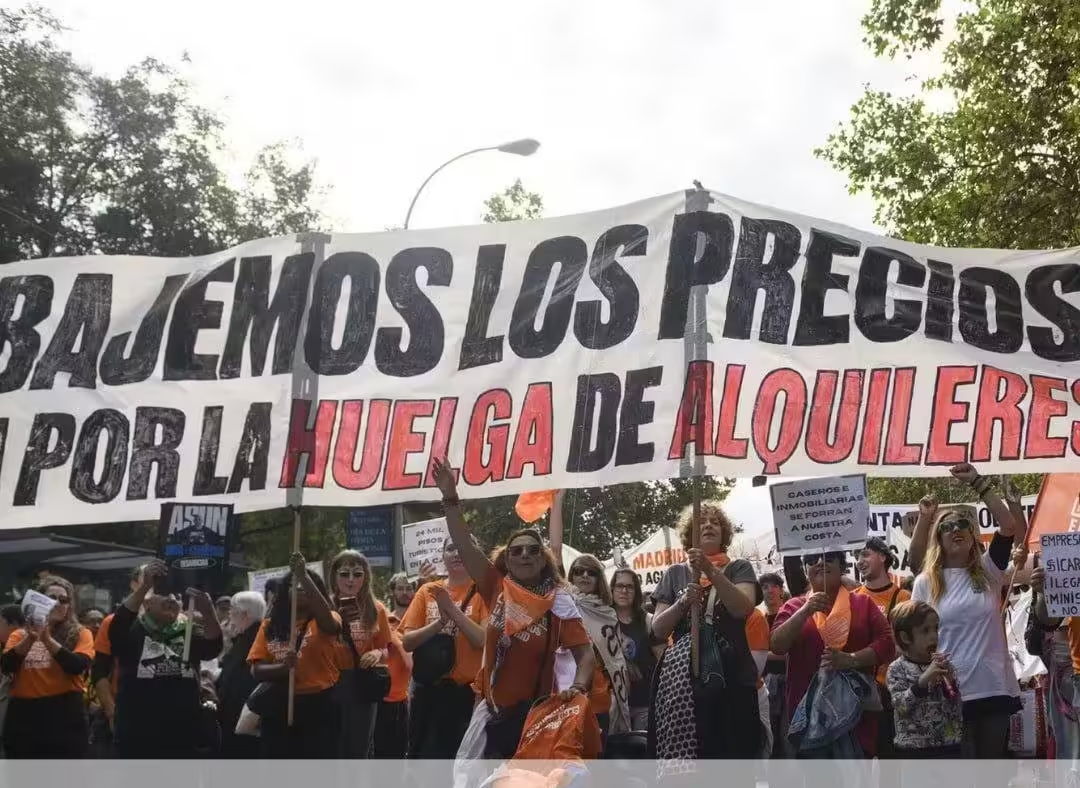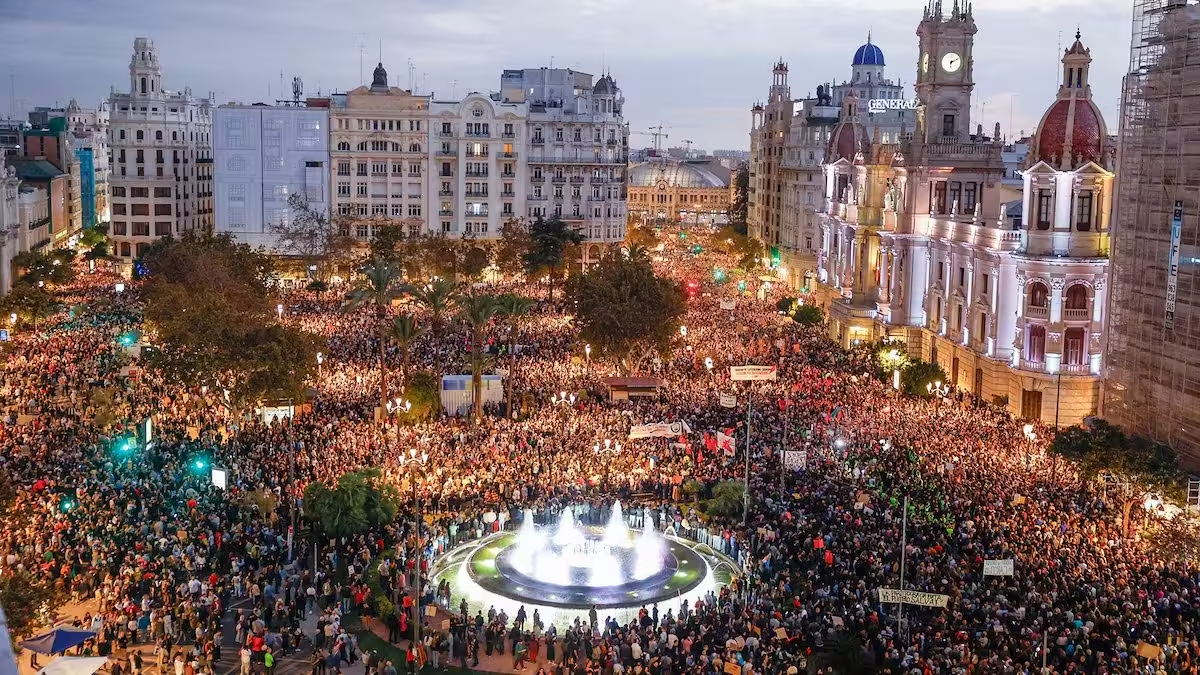Renters in Madrid Warn of Strike as Thousands Protest High Prices
In one of the largest housing protests in recent years, thousands of people flooded the streets of Madrid, demanding urgent action to lower rent prices. The protest, organized by the Madrid Tenants’ Union along with nearly 40 other groups, including CCOO (Workers’ Commissions) and the Platform for People Affected by Mortgages (PAH), drew a significant crowd. Official figures from the Government Delegation reported 22,000 participants, while organizers claimed up to 150,000.
With banners reading ‘Madrid will be the grave of rentism’ and ‘Landlords are stealing our wages,’ the demonstrators voiced their frustrations with the current rental market. Rent prices in Spain, especially in major cities like Madrid, have skyrocketed, making it difficult for many residents to find affordable housing.
A Call for a 50% Rent Reduction
The protest was held under the slogan ‘It’s Over. Let’s Lower Rent Prices,’ and some believe it could be the first step toward a rent strike if no action is taken. The demonstrators are calling for a 50% reduction in rental costs. According to Valeria Rapú, spokesperson for the Madrid Tenants’ Union, the demonstration was ‘historic’ and represents a growing movement against rising rent prices.
Speaking to the media, Rapú said, ‘Landlords and real estate investors are running out of time. If they continue to raise prices, tenants will stop paying altogether. There aren’t enough police, courts, or enforcers to evict us all.’ She stated that this was not a one-time event but part of a broader struggle for affordable housing in Spain.
Political Tensions and Demands for Resignations
As the protests gained momentum, demonstrators also called for the resignation of Spain’s Housing Minister, Isabel Rodríguez. Rapú criticized the government for offering ’empty promises’ and failing to implement meaningful reforms to reduce rental prices. Protesters accused Rodríguez of owning multiple properties, highlighting the disconnect between those in power and ordinary citizens struggling to afford rent.
The general secretary of Podemos, Ione Belarra, who attended the protest, echoed these sentiments. She blamed the rising cost of housing on the bipartisan policies of PSOE (Spanish Socialist Workers’ Party) and PP (People’s Party), accusing them of turning housing into a commodity for speculation rather than treating it as a basic human right.
Government’s Response and Criticism
In response to the protests, Housing Minister Isabel Rodríguez defended the government’s actions in a televised interview. She pointed to recent measures aimed at regulating the rental market and curbing the impact of tourist apartments, which have contributed to driving up rent prices in cities like Madrid.
Rodríguez also blamed previous governments, particularly the PP, for selling public housing to investment funds, which has worsened the housing crisis. She accused the president of the Madrid region, Isabel Díaz Ayuso, of refusing to regulate short-term rentals and failing to prioritize affordable housing.
Despite these claims, many argue that the government’s efforts have fallen short. Pablo Bustinduy, Minister of Social Rights and a key figure in the housing debate, has called for stronger intervention in the rental market. He proposed banning speculative property purchases in high-demand areas and limiting the number of tourist rentals. Bustinduy acknowledged that while there has been some progress in regions like Cataluña, where rental prices have dropped by 5%, much more needs to be done.
Protests Spread Beyond Madrid
While the Madrid protest was the largest, similar demonstrations took place across Spain. In Oviedo, dozens of people gathered outside the Asturian Parliament to demand lower rents.
In Barcelona, around 2,000 people gathered in the city center, calling for a new model that prioritizes residents over tourists. Demonstrators there also demanded an end to large-scale events, which they claim drive up local housing costs by catering to short-term visitors rather than permanent residents.
Housing Crisis Sparks National Debate
Spain’s housing crisis has become a central issue in national politics. The average rent in Spain has reached €1,874 per month, making it unaffordable for many young people. A 2023 study revealed that 66% of people aged 18 to 34 still live with their parents, compared to 50% in 2010. With rental prices taking up most of their income, many young professionals are unable to move out and live independently.
The debate surrounding how to address this crisis has created divisions within the government. While Housing Minister Rodríguez defends current policies, others like Bustinduy believe more aggressive action is needed. Many citizens, fed up with rising costs and limited options, are growing increasingly impatient.
The Road Ahead: A Divided Strategy
The current housing situation in Spain reveals a deep divide between those advocating for market regulation and those prioritizing free market policies. Protesters and activists demand more robust government intervention, including rent caps, restrictions on speculative purchases, and increased availability of social housing.
As protests continue to grow, the Spanish government faces mounting pressure to find a solution that balances market interests with the urgent needs of its citizens. For now, it remains to be seen whether the government can implement policies that will satisfy both tenants and property owners.
With no immediate resolution in sight, the housing crisis is likely to remain a contentious issue in Spain’s political landscape. The voices from the streets of Madrid, Barcelona, Oviedo, and beyond signal a growing discontent that could shape the country’s future housing policies.
Let us know what you think in the comments…
Thank you so much for your support! Reach out to us on Facebook and Instagram
For those interested in relocating to Spain we have created a Facebook Group How to Move to Spain to help you throughout the process. We will provide helpful free printables to keep you on track, online events to inform and support your journey, and above all create a community where you can ask questions and get advice. Please feel free to join!
Main image: X/@LAskatasuna
Share this content:




4 comments